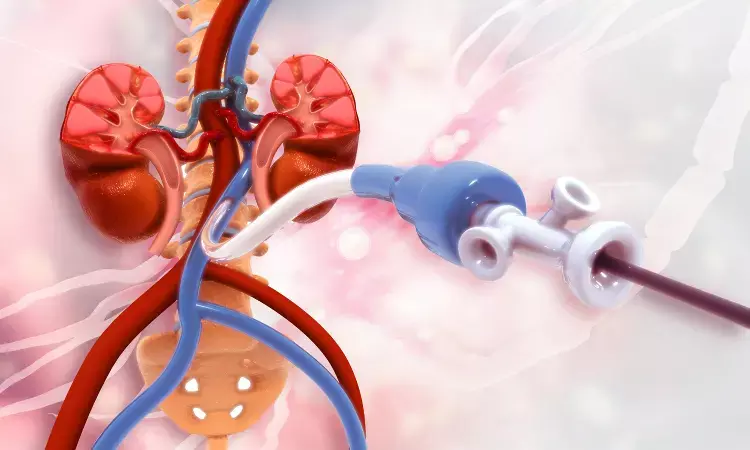- Home
- Medical news & Guidelines
- Anesthesiology
- Cardiology and CTVS
- Critical Care
- Dentistry
- Dermatology
- Diabetes and Endocrinology
- ENT
- Gastroenterology
- Medicine
- Nephrology
- Neurology
- Obstretics-Gynaecology
- Oncology
- Ophthalmology
- Orthopaedics
- Pediatrics-Neonatology
- Psychiatry
- Pulmonology
- Radiology
- Surgery
- Urology
- Laboratory Medicine
- Diet
- Nursing
- Paramedical
- Physiotherapy
- Health news
- Fact Check
- Bone Health Fact Check
- Brain Health Fact Check
- Cancer Related Fact Check
- Child Care Fact Check
- Dental and oral health fact check
- Diabetes and metabolic health fact check
- Diet and Nutrition Fact Check
- Eye and ENT Care Fact Check
- Fitness fact check
- Gut health fact check
- Heart health fact check
- Kidney health fact check
- Medical education fact check
- Men's health fact check
- Respiratory fact check
- Skin and hair care fact check
- Vaccine and Immunization fact check
- Women's health fact check
- AYUSH
- State News
- Andaman and Nicobar Islands
- Andhra Pradesh
- Arunachal Pradesh
- Assam
- Bihar
- Chandigarh
- Chattisgarh
- Dadra and Nagar Haveli
- Daman and Diu
- Delhi
- Goa
- Gujarat
- Haryana
- Himachal Pradesh
- Jammu & Kashmir
- Jharkhand
- Karnataka
- Kerala
- Ladakh
- Lakshadweep
- Madhya Pradesh
- Maharashtra
- Manipur
- Meghalaya
- Mizoram
- Nagaland
- Odisha
- Puducherry
- Punjab
- Rajasthan
- Sikkim
- Tamil Nadu
- Telangana
- Tripura
- Uttar Pradesh
- Uttrakhand
- West Bengal
- Medical Education
- Industry
Vaccination protects patients on dialysis from severe COVID-19

Washington, DC: In an analysis of patients with kidney failure receiving dialysis who had become infected with SARS-CoV-2, those who were vaccinated had a lower risk of experiencing severe COVID-19. The findings, which are published in CJASN, re-iterate the benefits of COVID-19 vaccination in this patient population.
Various studies have shown that individuals on hemodialysis have impaired immune responses to COVID-19 vaccines, but few studies have described the efficacy of COVID-19 vaccination in such patients.
To investigate, Debasish Banerjee, MD, FRCP (St. George's University Hospitals NHS Foundation Trust, London) and his colleagues conducted a multi-center observational study of patients who were receiving hemodialysis in London and who were being regularly tested for COVID-19 during the period of vaccine roll-out with Pfizer-BioNtech's BNT162b2 and AstraZeneca's AZD1222.
SARS-CoV-2 infection was identified in 1,323 patients of different ethnicities (Asian/other 30%, Black 38%, and White 32%) including 1,047 (79%) unvaccinated, 86 (7%) post–first-dose, and 190 (14%) post–second-dose vaccination.
Among the major findings:
1. Most patients who tested positive had a mild course of COVID-19, but 515 (39%) were hospitalized and 172 (13%) died.
2. Older age, diabetes, and immune suppression were associated with greater illness severity.
3. After adjustments, prior two-dose vaccination was associated with a 75% lower risk of hospital admission and an 88% lower risk of death compared with no vaccination.
4. No loss of protection against COVID-19 was seen in patients older than 65 years, or with increasing time since vaccination, and no difference was seen between vaccine types.
"COVID-19 continues to be common in patients on dialysis, causing hospital admissions and death, but fortunately it is milder with two doses of the vaccine," said Dr. Banerjee.
An accompanying editorial notes that the study's encouraging results prove the effectiveness of COVID-19 vaccines for patients on dialysis, but there is still much work to be done. "While the COVID-19 pandemic is ever changing, making vaccine studies challenging, it also provides new opportunities to examine vaccine effectiveness from many different angles," the authors wrote.
For further information, check out the following link:
Dr Kamal Kant Kohli-MBBS, DTCD- a chest specialist with more than 30 years of practice and a flair for writing clinical articles, Dr Kamal Kant Kohli joined Medical Dialogues as a Chief Editor of Medical News. Besides writing articles, as an editor, he proofreads and verifies all the medical content published on Medical Dialogues including those coming from journals, studies,medical conferences,guidelines etc. Email: drkohli@medicaldialogues.in. Contact no. 011-43720751


